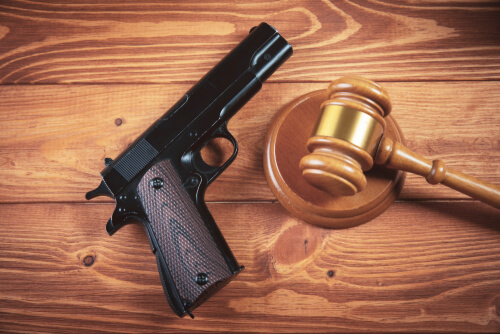On March 21, 2023, a three-judge appellate panel decided the Bergen County case of In the Matter of the Appeal of the Denial of M.U.’s Application for a Handgun. The first principle issue concerned the constitutionality of the denial of appellant’s permit to purchase a firearm for reasons related to “the public health, safety or welfare.”
Judge Geiger wrote for the Court in relevant part: We reject appellant’s arguments that N.J.S.A. 2C:58-3(c)(5) is unconstitutionally vague or overbroad. Bruen, Heller, and McDonald do not undermine the holdings in F.M., Burton, Winston, and Dubov that upheld the “public health, safety or welfare” disqualifier for issuance of a HPP or FPIC. On the contrary, considering the historical traditions and analogues we have described and our historical analysis of those who were disarmed, we conclude it is likewise well-rooted in the nation’s history and tradition of firearm regulation that individuals whose armament poses a risk to “public health, safety or welfare,” as evidenced by their record of misconduct that evinces a disrespect for the rule of law, are likewise beyond the ambit of “the people” protected by the Second Amendment. This includes misconduct that did not involve violence against the victim or result in a criminal conviction.
The historical record convinces us that non-violent individuals were regularly disarmed between the seventeenth and nineteenth centuries because legislatures determined those individuals lacked respect for the rule of law and fell outside the community of law-abiding citizens. The Supreme Court’s repeated characterization of Second Amendment rights as belonging to “law-abiding” citizens supports this conclusion. See Bruen, 142 S. Ct. at 2122; Heller, 554 U.S. at 635; cf. Cornell, at 672 (stating the right to keep and bear arms was historically “limited to” persons “deemed capable of exercising it in a virtuous manner”). Accordingly, we hold that N.J.S.A. 2C:58-3(c)(5) does not violate the Second Amendment.
Judge Geiger’s reasoning here is likely guided by the dissenting opinions in Bruen. Bruen’s author, Justice Clarence Thomas, took issue with the denial of the right to purchase a firearm based on a misdemeanor conviction. Therefore, Justice Thomas would almost certainly take exception with the denial of a purchaser identification card based on alleged criminal conduct “that did not result in a conviction.”
